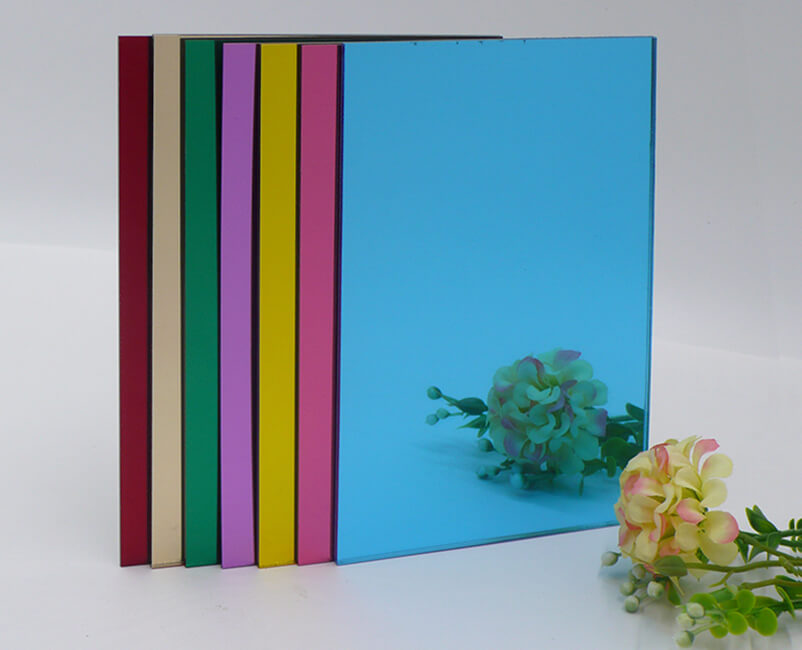Balancing the reflectivity and clarity of PS mirror sheets requires attention to several key factors, including material quality, manufacturing processes, coatings, and application environments. Here are the primary ways to optimize both reflectivity and clarity in PS mirror sheets:
The quality of the PS base material significantly impacts the clarity of the mirror sheet. Using higher-grade PS with fewer impurities will result in a smoother surface, which enhances both reflectivity and clarity.
The smoother the PS surface, the better it will reflect light and produce clearer images. Any imperfections in the material can lead to light scattering, which reduces clarity and causes image distortion. Ensuring a high-quality, smooth finish during the production process can mitigate this issue.
The reflective layer applied to PS mirror sheets, typically made of aluminum or silver, plays a crucial role in reflectivity. Using high-quality, uniform coatings ensures better light reflection. Coatings should be applied under controlled conditions to prevent uneven surfaces, which can reduce both reflectivity and clarity.
The thickness of the mirror coating must be carefully calibrated. If it is too thin, it may reduce reflectivity, and if it is too thick, it can introduce defects or distortions in the reflection. A balance must be struck to ensure maximum reflectivity without compromising clarity.
Thicker PS mirror sheets generally provide better clarity because they are more rigid and less prone to warping or bending. Flexibility in thinner sheets can lead to distortions in the reflected image, reducing clarity. While thinner sheets are more lightweight and cost-effective, they may sacrifice some optical quality.
To enhance clarity, using a PS sheet of appropriate thickness and ensuring a strong backing (such as a rigid frame) will minimize bending and warping, which are common causes of reflection distortion in flexible materials.
Since PS is more prone to scratches than other materials like acrylic or glass, adding a scratch-resistant coating on top of the reflective layer can help maintain clarity over time. Scratches diffuse light, reducing reflectivity and making the surface appear cloudy.

In some applications, adding an anti-glare or light-diffusion coating can help balance reflectivity with the desired clarity. This is especially useful in environments where excessive light reflections could cause visual discomfort or reduce the effectiveness of the mirror.
Exposure to UV light can cause degradation of the PS material, leading to yellowing or clouding, which reduces both clarity and reflectivity over time. Applying UV-resistant coatings or limiting exposure to UV light can preserve the optical properties of the PS mirror sheet.
PS is sensitive to temperature changes, and excessive heat can cause warping, which affects both reflectivity and clarity. Ensuring the mirror is used in environments with controlled temperatures can maintain the optical performance of the sheet.
Using precise cutting and polishing techniques during manufacturing ensures that the edges of the PS mirror sheet are smooth and free from imperfections, which can improve clarity. Laser cutting helps prevent cracking or warping that could impact the surface's optical properties.
This process, which involves applying the reflective metal layer to the PS sheet in a vacuum chamber, ensures an even, thin coating that maximizes reflectivity. Any inconsistencies in the coating process can lead to reduced light reflection and poorer image quality.
In applications where reflectivity and clarity are critical, ensuring the PS mirror sheet is mounted on a stable, rigid backing can prevent warping. A stable mounting system helps maintain the sheet's shape and prevents bending, which can distort reflections.
Using PS mirror sheets in controlled lighting environments where glare and excessive light exposure are minimized helps maintain clarity and reflectivity. Bright, uncontrolled lighting can reduce the effectiveness of PS mirrors by creating hotspots or glare.
Keeping the PS mirror sheet clean is essential for both clarity and reflectivity. Dust, dirt, and smudges on the surface can diffuse light, reducing both properties. Cleaning with a soft cloth and non-abrasive cleaners helps maintain optical performance.
Avoiding Harsh Chemicals: Since PS is sensitive to certain solvents and chemicals, it's crucial to avoid using cleaners that could damage the reflective coating or surface finish. Over time, chemical degradation can lead to clouding or loss of reflectivity.
To balance reflectivity and clarity in PS mirror sheets, careful attention must be paid to the quality of the base material, the uniformity and thickness of the reflective coating, and the environmental conditions in which the sheet is used. Precision manufacturing, proper protective coatings, and regular maintenance all contribute to optimizing the optical performance of PS mirror sheets. By addressing these factors, it is possible to achieve a good balance between reflectivity and clarity, making PS mirrors suitable for a range of applications, from decorative use to lightweight mirrors.
 English
English 中文
中文 Español
Español


